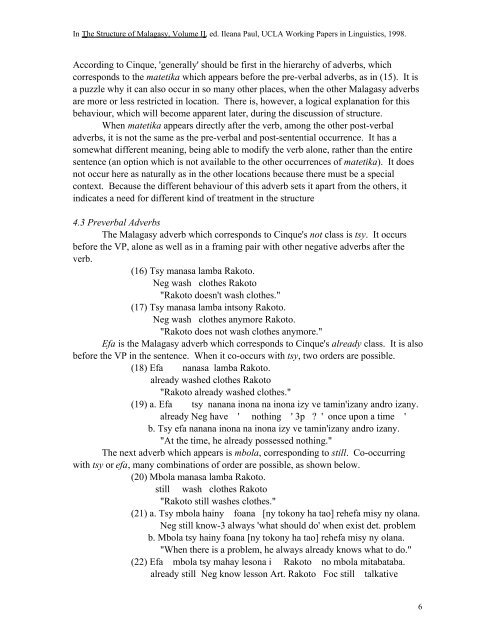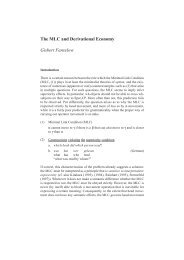Malagasy Adverbs Andrea Rackowski McGill University August 1996
Malagasy Adverbs Andrea Rackowski McGill University August 1996
Malagasy Adverbs Andrea Rackowski McGill University August 1996
You also want an ePaper? Increase the reach of your titles
YUMPU automatically turns print PDFs into web optimized ePapers that Google loves.
In The Structure of <strong>Malagasy</strong>, Volume II , ed. Ileana Paul, UCLA Working Papers in Linguistics, 1998.<br />
According to Cinque, 'generally' should be first in the hierarchy of adverbs, which<br />
corresponds to the matetika which appears before the pre-verbal adverbs, as in (15). It is<br />
a puzzle why it can also occur in so many other places, when the other <strong>Malagasy</strong> adverbs<br />
are more or less restricted in location. There is, however, a logical explanation for this<br />
behaviour, which will become apparent later, during the discussion of structure.<br />
When matetika appears directly after the verb, among the other post-verbal<br />
adverbs, it is not the same as the pre-verbal and post-sentential occurrence. It has a<br />
somewhat different meaning, being able to modify the verb alone, rather than the entire<br />
sentence (an option which is not available to the other occurrences of matetika). It does<br />
not occur here as naturally as in the other locations because there must be a special<br />
context. Because the different behaviour of this adverb sets it apart from the others, it<br />
indicates a need for different kind of treatment in the structure<br />
4.3 Preverbal <strong>Adverbs</strong><br />
The <strong>Malagasy</strong> adverb which corresponds to Cinque's not class is tsy. It occurs<br />
before the VP, alone as well as in a framing pair with other negative adverbs after the<br />
verb.<br />
(16) Tsy manasa lamba Rakoto.<br />
Neg wash clothes Rakoto<br />
"Rakoto doesn't wash clothes."<br />
(17) Tsy manasa lamba intsony Rakoto.<br />
Neg wash clothes anymore Rakoto.<br />
"Rakoto does not wash clothes anymore."<br />
Efa is the <strong>Malagasy</strong> adverb which corresponds to Cinque's already class. It is also<br />
before the VP in the sentence. When it co-occurs with tsy, two orders are possible.<br />
(18) Efa nanasa lamba Rakoto.<br />
already washed clothes Rakoto<br />
"Rakoto already washed clothes."<br />
(19) a. Efa tsy nanana inona na inona izy ve tamin'izany andro izany.<br />
already Neg have ' nothing ' 3p ? ' once upon a time '<br />
b. Tsy efa nanana inona na inona izy ve tamin'izany andro izany.<br />
"At the time, he already possessed nothing."<br />
The next adverb which appears is mbola, corresponding to still. Co-occurring<br />
with tsy or efa, many combinations of order are possible, as shown below.<br />
(20) Mbola manasa lamba Rakoto.<br />
still wash clothes Rakoto<br />
"Rakoto still washes clothes."<br />
(21) a. Tsy mbola hainy foana [ny tokony ha tao] rehefa misy ny olana.<br />
Neg still know-3 always 'what should do' when exist det. problem<br />
b. Mbola tsy hainy foana [ny tokony ha tao] rehefa misy ny olana.<br />
"When there is a problem, he always already knows what to do."<br />
(22) Efa mbola tsy mahay lesona i Rakoto no mbola mitabataba.<br />
already still Neg know lesson Art. Rakoto Foc still talkative<br />
6
















